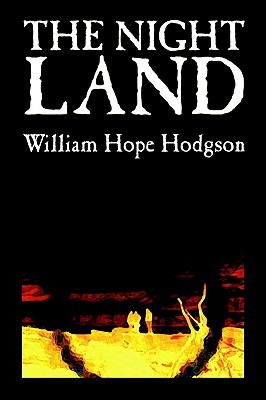Adventures in Bookland: The Night Land by William Hope Hodgson

Channelling my inner football pundit, if ever there was a book of two halves, this is it. As to the content of those two halves, the subtitle of The Hobbit describes it perfectly: there and back again.
But this is also a book that is difficult to review as it was both one of the most extraordinary and one of the worst books I’ve ever read – although the extraordinariness outweighed the bad sufficiently to pull me through to the ending, even though the second half of the book (the back again) was significantly worse than the first half (the there).
It’s also a book whose influence has been substantial. Its narrative structure was stolen wholesale by Olaf Stapledon for his extrapolation of humanity’s future, Last and First Men and its vision of the future has inspired a whole tranche of writers.
So, let’s say something about The Night Land. It begins in some undetermined but vaguely early modern kingdom where a young man of low station falls in love with a princess, who after some trials returns his love, and they are married, blissfully happy until the princess dies in childbirth and the unnamed narrator is stricken with grief. Then, in his grief, a message, an intimation from the far future reaches back to him, of his own soul reborn into the last age of mankind, when all humanity has retreated to its final redoubt, a huge pyramidal structure, to hold against the obscure but terrifying monsters that plague the Night Land – for the sun has gone out and all is dark. But when I say all humanity, it turns out that this is not the case: there is another colony, holding out against the Night, and among its residents is the reincarnation of the narrator’s lost love.
Mirdath the Beautiful is her name and the narrator leaves the safety of the Last Redoubt in search of her (the there). This part, as the narrator travels through one of the strangest, most intensely imagined landscapes ever committed to paper, is the strongest part of the book, as the deep horror of this haunted land drags the reader into the story: it’s an extraordinary imaginative exercise in an almost physical darkness.
But finally reaching the other redoubt, our narrator finds that it has fallen to the forces of the night. However, he finds the reincarnation of Mirdath the Beautiful and then begins the back again. Here is where the story drags, firstly because they are literally going back over the same footsteps and with largely the same dangers and obstacles, but secondly and worse because of the turgidity of the love story – yes, we know she is the most beautiful and lovely woman in the world but there is a limit to how often we need to be told that as readers, that limit being reached before they have managed to cover more than one tenth of the journey home.
So, I confess, the back again part I read with the aid of a fair amout of skipping – whenever it returned to another bout of mutual mooning, or teenage squabbling (with a weird overlay of corporal punishment) I turned the page – but having travelled so far with our narrator, I wanted to see him home again. And they make it! Back to humanity’s final refuge, holding out against monsters and evils too strange to even describe, until it too falls and the night rules all.
The whole thing is written in repetitive, cod-17th century prose, however I found that less of an issue than the irritation with the cooing love couple.
But the vision – ah, the vision, of the earth in its desuetude and the final struggle of humanity against the night…
There are few books that can overcome so many problems with their style and their plot, but this is one of them. I will remember it long after many ‘better’ books.
0 Comments